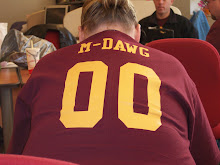Last Saturday, I had the pleasure to attend a showing of a documentary called Traces of the Trade at the House of Seven Gables. The documentary is about filmmaker Katrina Browne's discovery that her New England ancestors were the largest slave-trading family in U.S. history. From 1769 to 1820, the DeWolf family was involved in the slave trade (Interesting fact: In 1808, a law was passed prohibiting the importation of slaves and it wasn't until 1820 that participating in the slave trade was an act of piracy and punishable by death).
The film follows Browne and nine members of her family on a journey that retraces the steps of her ancestors and their involvement with the Triangle Trade. They start their journey in Bristol, Rhode Island, move on to slave forts in Ghana, and then onto Havana, Cuba to visit the ruins of a family plantation.
I found the film interesting since we have been taught to believe in our history that it was the Southern states that were the evil ones when it came to the topic of slavery. The film forces us to stop and think about our history and the damage that has been done to African-Americans and the involvement and the role of the Northerners during this time period.
After we viewed the film, we had a walking tour - compliments of the National Park Service - throughout Salem. As we walked through Salem, there was visual evidence of the role of historical "Salemites" and their involvement in the Triangle Trade. For example, the Derby family is a HUGE historical name in Salem. The Derby family made their wealth off of the slave trade. Again, makes you stop and think about our history and how we should be teaching it to our students.
This past week, I purchased this book. The book is about the unique story of Thomas Norman DeWolf's experiences during the making of the documentary feature film Traces of the Trade: A Story from the Deep North. The book is a nice companion to go with the film. I highly recommend reading the book if you are interested in this topic.
One of the reasons why I enjoy History so much is that it makes you think and question our past. Attending this seminar last Saturday did just that - made me question and think about the involvement of North and South during the slave trade. The film also made me question what is the legacy of slavery and what history do we inherit as individuals and as citizens. Also, how does the Northern involvement make this topic much more complex? And, finally, the topic of reparations - should African-Americans receive some form of payment?
If there happens to be a screening of the film, please check it out. Also, check with PBS. They were showing the film throughout the summer.
Saturday, November 15, 2008
Subscribe to:
Post Comments (Atom)

No comments:
Post a Comment